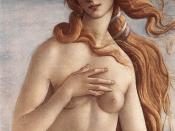The origin of the universe can be explained by modern astronomers and
astrophysicists, while archaeologists and historians try to clarify the origin of human societies. In the distant past, however, before any sciences existed, the beginnings of the world and of society were explained by MYTHOLOGY.
The dictionary defines mythology as the myths dealing with the gods, demigods,
and legendary heroes of a particular people. The word myth is often mistakenly understood to mean fiction-something that never happened, a made-up story or fanciful tale. Myth is really a way of thinking out the past. Myths do not correctly explain what literally happen but suggest that behind the explanation there is a reality that cannot be seen and examined. One of the best-known mythological books is Homer's 'Iliad', which tells of the Trojan War. No one reading the book today believes Homer's story as a historically factual account. However it is believed that at some time, many centuries before Homer lived-there really was a war between the Greek city-states and the residents of northwestern Asia Minor.
Myths try to answer several questions. Where did the world come from? What are the gods like, and where did they come from? How did humanity originate? Why is there evil in the world? What happens to people after they die? Myths also try to account for a society's customs and rituals. Myths are used to justify the way a society lives. Ruling families in several ancient civilizations found justification for their power in myths that described their origin in the world of the gods or in heaven. Myths did not originate in written form. They developed slowly as an oral tradition that was handed down form generation to generation among people who were trying to make sense of the world around them. They tried...



Roman And Greek Mythology.
This is a well researched and supported essay. With a little more work, it could be college level quality. It feel more like an outline rather than an in-depth paper. It needs more meat.
0 out of 0 people found this comment useful.